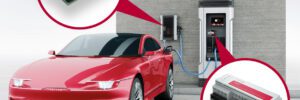Vector’s vSECC charge control units are designed to provide versatile controllers for smart charging stations. Available in three different versions, the controllers support up to two charge points using different standards simultaneously, making them suitable for public fast chargers, compact single charge points and wallboxes.
The vSECC controller serves as a communication interface between the charging station, the vehicle, charging management software, power electronics and other peripherals. Vector has contributed its charging expertise to various standards organizations, and actively participated in the development of the ISO 15118-20 standard. This standard enables features such as bidirectional charging, which are now available in the vSECC controllers and vSECClib.CCS software library for vehicle communication.
The vSECC, vSECC.single and vSECC.single Board control units all include these capabilities, so they are ready for use with bidirectional-capable charging stations and vehicles. Vector has also optimized the vSECC Controllers and vSECClib.CCS library for “grid-friendly charging”, with Dynamic Control Mode allowing the charging station controller to control the power profile. This prevents the vehicle from pausing the charging process, ensuring smooth bidirectional charging. The vSECClib.CCS also features an extension that relates to the parallelization of messages through multiplex communication, reducing wear and tear on expensive DC contactors and shortening response times to changes in the environment.
FAQ
Q1: Are electric car batteries recyclable?
A1: Yes, electric car batteries are recyclable.
Q2: Are electric car chargers free?
A2: It depends on the charger and the location. Some electric car chargers are free, while others may require a fee.
Q3: Can electric car batteries be rebuilt?
A3: Yes, electric car batteries can be rebuilt with the right tools and knowledge.









